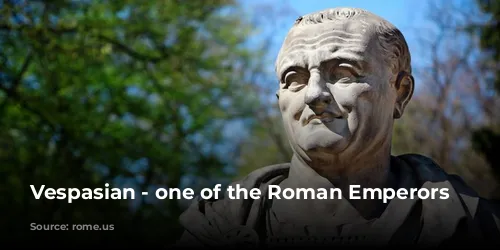Vespasian, a name that resonates with history, wasn’t born into a life of luxury. He was, however, destined for greatness. He was the Roman emperor from 69 to 79 AD, marking the end of a turbulent period in Roman history. The year 69 AD saw a chaotic succession of four emperors, each meeting their demise through suicide or murder. But Vespasian, a man of resilience and wisdom, reigned for a decade, leaving behind a legacy of peace and prosperity.
The path to the throne was not paved with silver spoons for Vespasian. Born in a small town near Rome, his early life was shaped by his grandmother’s guidance. He embarked on a distinguished military career, serving in various roles, from a colonel in Thrace to a commander of a legion in Germany and Britain. He even held the prestigious position of a quaestor, a financial official, on the island of Crete and in Libya. He spent a significant portion of his life away from Rome, serving diligently during the tumultuous reigns of Caligula, Claudius, and Nero.
Vespasian’s rise to power was a testament to his fortitude and strategic prowess. In 66 AD, amidst the Jewish revolt in Judea, he was entrusted with suppressing the rebellion. He, alongside his son Titus, led the Roman forces, ultimately quelling the uprising. Though the war resulted in the tragic loss of thousands of Jewish lives and the destruction of many towns, it also contributed to the construction of the Colosseum, a monumental testament to Roman engineering and a symbol of Vespasian’s reign.
The emperor’s legacy goes beyond his military victories. He embraced a philosophy of peace and stability, a stark contrast to the chaos of the preceding years. He meticulously focused on rebuilding Rome, restoring its grandeur after the civil wars. He commissioned grand structures like the Temple of Peace and the Temple to the Deified Claudius, and revived the Theater of Marcellus. The Colosseum, funded by the spoils of the Jewish Temple, stands as his most enduring architectural monument.
Vespasian’s reign was also characterized by a pragmatic approach to finance. He introduced a tax on the use of public toilets, a controversial measure that earned him both criticism and admiration. This tax, though perceived as unconventional, reflected Vespasian’s determination to secure the empire’s financial stability. The famous phrase, “Money does not stink,” is often attributed to him, highlighting his practicality and lack of aversion to even less-than-glamorous sources of revenue.
Vespasian’s leadership left a lasting impact on the Roman world. He ushered in an era of peace and prosperity, leaving a legacy of remarkable architectural achievements and a renewed sense of stability. His reign was marked by a focus on rebuilding, economic reform, and the pursuit of peace. He may not have been born into nobility, but his unwavering dedication and shrewd leadership secured him a place in history as a wise and influential ruler.

